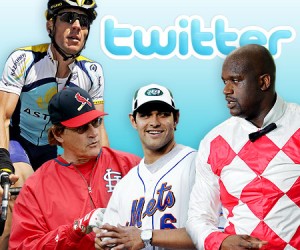
Stephon Marbury should’ve refrained from life-streaming. Starbury TV, as far as I’m concerned, was an epic failure. Why?
David Neiman of Athlete Interactive put it so poignantly that I’ll just share what he had to say and let you judge for yourself:
“We want athletes to awe us, and that’s precisely what they do when they’re doing what they do best: playing sports. Think of your favorite highlight — Michael Jordan hitting over Bryon Russell, John Elway going head over heels into the end zone, whatever comes to mind. That moment has an epic, emotional power; you might find yourself shaking your head in amazement right now just thinking about it. But more than just witnessing that moment, you felt part of it. A critical part of being a fan is sharing in the experience of athletes you like.”
Do you see where this is going?
“With rare exception, what people don’t want – despite claiming the opposite – is to really “know” athletes in a way that diminishes them, a point driven home by Marbury. When it comes to athletes, people want a sense of connection, but only if it reinforces awe or respect.”
I think David is spot on in his assessment of Marbury’s experiment. Read the entire piece here.
 On Twitter athletes can control their 140 character messages easily. On Facebook, the same with their status updates. They can upload YouTube clips of their highlights, funny interviews, game pictures, etc. Even on a blog they can carefully construct the message they want to share with their fans. They can even do this with short prepared videos, but not in life streaming, not the way Marbury did it.
On Twitter athletes can control their 140 character messages easily. On Facebook, the same with their status updates. They can upload YouTube clips of their highlights, funny interviews, game pictures, etc. Even on a blog they can carefully construct the message they want to share with their fans. They can even do this with short prepared videos, but not in life streaming, not the way Marbury did it.
Being forced to be “on” all the time is tough. Being in the raw, exposed in the flesh for your fans is a tough scenario for even the most seasoned media veterans, much less a loose cannon like Marbury.
You SHOULD NOT lifestream when:
- You want to share a personal message that will take less than 10 minutes. If you know what you want to say just use YouTube, Viddler or Vimeo to record your message then use your social tool(s) of choice to spread it to your fans/consumers.
- You want to quickly engage some of your most passionate fans/consumers. Hit them up on Twitter, write a blog post asking them for their insights and opinions and respond to the relevant ones via the comments section.
- You’re bored, you have a few screws loose, and you will invariably do something ignorant that may seem to you like you’re humanizing your brand and connecting with your fans, but in reality you’re probably removing your cloak of mystique and doing irreparable damage to your reputation.
So how and when should you life-stream, if ever?
1.) When you want to answer questions and connect with your fans for a reasonable period of time (see: 30 minutes to an hour). Taking the time to answer fans’ questions is an awesome gesture. If your brand is big enough you’ll get enough variety of questions that you can choose the ones you want to answer, which will enable you to build your brand and connect with your fans simultaneously.
2.) The only time you should EVER life-stream for more than an hour is for something like raising money for charity where part of the gimmick is the extended period of ‘live’ time. In this instance you should have segments and time blocks at least somewhat planned out. It would also help to interview other people, take breaks and allow other athletes, co-workers, members of your entourage carry some of the load.
What do you think about the Starbury TV experiment or athletes life-streaming in general? I understand it can be entertaining. I came out of a meeting Friday afternoon to see our entire office watching him, but let’s face it people like watching train wrecks, but they don’t build brand affinity for the train company. What are some other occasions where you think life-streaming would be appropriate?
##
Photo Credits: Stephon Marbury ; Athletes on Twitter


I see what your saying, and I agree with everything, but I think the Starbury thing is a whole different story.
I’m not sure it had anything to do with media coverage, or connecting with fans or anything like that…I think he’s just losing it… I don’t think he aimed for this to be an experiment or that he had an agenda…but i could be completely wrong as I haven’t follow the stories too much.
That said it definitely puts into perspective exactly how personal people, and athletes, should be getting. It’s good to give some insight to your personality but I don’t think you ever want to go that deep. As Beth Harte would say, it’s translucency, not transparency.
@DavidSpinks